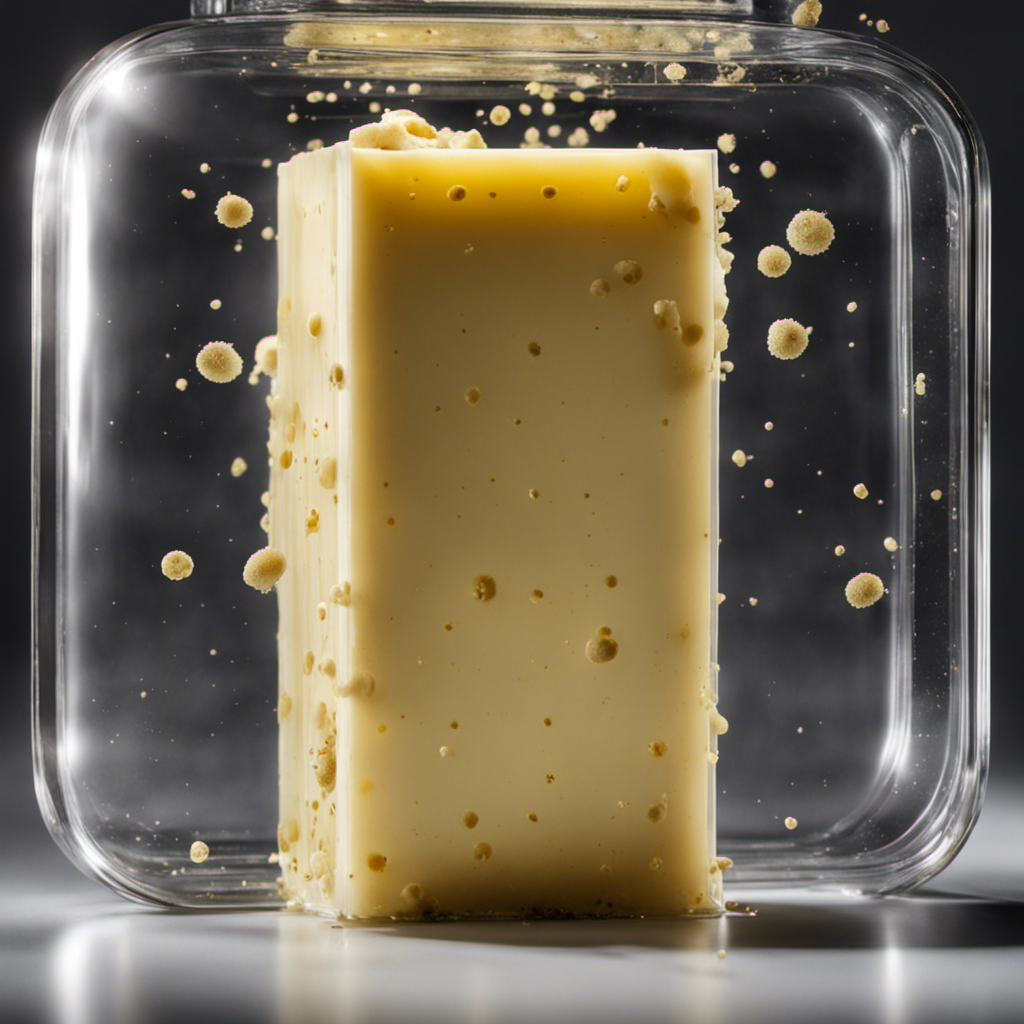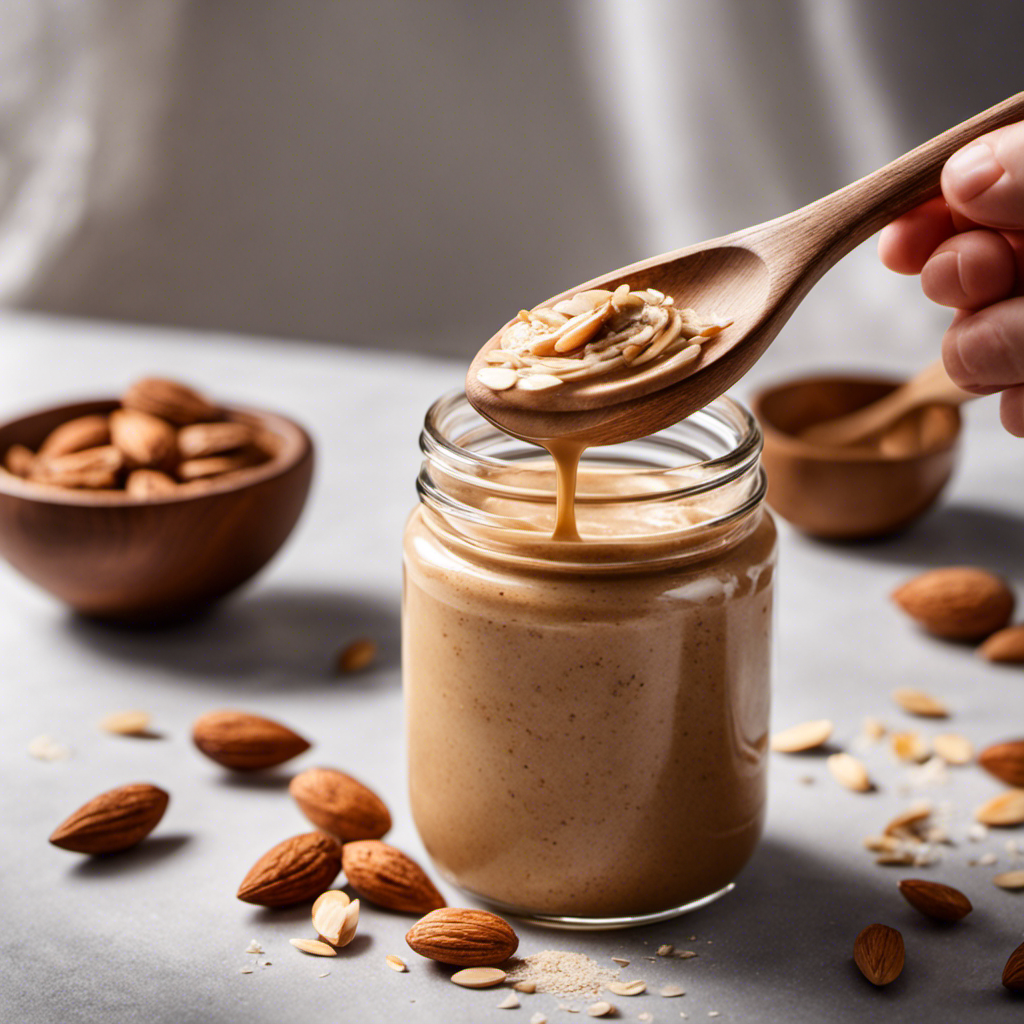As someone who loves butter, I have learned that just like all good things in life, butter also has a shelf life. But do not worry, I am here to help you determine if your favorite butter has expired.
In this concise and informative article, I’ll walk you through the visual inspection, the sniff test, the color and consistency examination, the expiration date reading, and even a daring tasting test.
Let’s ensure our butter stays fresh and delicious!
Key Takeaways
- Mold growth, fuzzy green or black spots, and yellowish discoloration are signs of expired butter.
- Off-putting odors, such as rancid or sour smells, indicate that the butter has passed its expiration date.
- Discoloration, dull gray or brown color, and grainy or lumpy consistency are indicators of spoilage.
- Checking the expiration date and consulting professionals can help determine the freshness and safety of the butter.
Visual Inspection
I can quickly determine if butter is expired by visually inspecting it for any signs of mold or discoloration. Butter has a shelf life of about one to three months, depending on the storage conditions.
When checking for expiration, I first examine the surface of the butter. If there are any fuzzy, green, or black spots, it’s a clear indication of mold growth, and the butter should be discarded immediately.
Discoloration can also be a sign of spoilage. If the butter appears yellowish or has a rancid smell, it’s likely past its prime. Additionally, any off-putting odors shouldn’t be ignored.
Check for Off Odor
The butter smells off, so I know it’s expired. Checking the odor is an important step in determining the freshness of butter. When butter is past its expiration date, it can develop a rancid or sour smell. If you notice any unusual or unpleasant odors coming from the butter, it’s best to discard it. To help you understand the signs of expired butter, here is a table summarizing the key points:
| Signs of Expired Butter |
|---|
| Off or rancid smell |
| Mold growth |
| Strange color |
If you come across any of these signs, it’s crucial to discard the butter immediately to avoid any health risks. If you’re unsure about the safety of the butter or have any concerns, it’s always a good idea to consult a food safety expert for guidance. They can provide you with accurate information and advice on handling expired food items.
Examine Color and Consistency
Upon examining the color and consistency, it becomes clear if the butter has spoiled or not.
Fresh butter should have a vibrant yellow color and a smooth, creamy consistency. If the butter has turned a dull gray or brown color, or if it appears to be grainy or lumpy, it’s likely past its shelf life and shouldn’t be consumed.
Proper storage is crucial in maintaining the freshness of butter. It should be stored in an airtight container in the refrigerator, away from strong-smelling foods.
Butter should also be kept away from direct sunlight and heat, as they can accelerate spoilage.
Read the Expiration Date
Reading the expiration date on the butter packaging is an important step in determining its freshness and safety. It provides valuable information about when the butter should be consumed by or if it has already expired.
When checking the expiration date, it’s crucial to look for signs of spoilage, such as discoloration or an off smell. If the butter has passed its expiration date and shows signs of spoilage, it’s best to discard it to avoid any potential health risks.
In some cases, if you’re unsure about the quality or safety of the butter, it’s recommended to consult a professional, such as a food safety expert or a nutritionist. They can provide guidance and advice on whether the butter is still safe to consume.
Perform a Tasting Test
After checking the expiration date, I can perform a quick tasting test to determine if the butter is still fresh and safe to use. Sensory evaluation is key in this process.
First, I examine the appearance of the butter. Fresh butter should have a creamy yellow color, whereas expired butter may appear pale or have a grayish tint.
Next, I take a small amount of the butter and smell it. Fresh butter has a pleasant, milky aroma, while rancid butter may smell sour or musty.
Finally, I taste a tiny bit of the butter. Fresh butter has a smooth, rich flavor, whereas expired butter may taste off or have a rancid aftertaste.
Frequently Asked Questions
Can I Still Use Expired Butter for Baking or Cooking?
Yes, you can still use expired butter for baking or cooking, but it may affect the taste and quality of your dish. To avoid this, consider using expired butter alternatives or learn how to properly store butter.
Can I Freeze Expired Butter to Extend Its Shelf Life?
Yes, you can freeze expired butter to extend its shelf life. Freezing can help preserve its freshness and prevent spoilage. Additionally, there are alternative uses for expired butter, such as using it for cooking or baking.
How Long Does Butter Typically Last After Its Expiration Date?
Butter typically lasts for about a week after its expiration date. To ensure its freshness, store butter in the refrigerator and check for signs of spoiled butter, such as a rancid smell or mold.
Is It Safe to Consume Butter That Has Been Left Outside of the Fridge for a Few Hours?
Leaving butter outside the fridge for a few hours may compromise its safety. However, if you’re looking to extend its shelf life, there are methods like using a butter bell that can help.
Are There Any Health Risks Associated With Consuming Expired Butter?
There are potential health risks associated with consuming expired butter. It may contain harmful bacteria that can lead to food poisoning. It’s best to check for any signs of spoilage and consider using healthier alternatives.
Conclusion
After conducting visual inspections, checking for off odor, examining color and consistency, reading the expiration date, and even performing a tasting test, it’s clear that determining whether butter is expired or not is a straightforward process.
By following these steps, one can confidently decide whether to continue using the butter or discard it.
Remember, it’s crucial to prioritize food safety and avoid consuming expired products.









